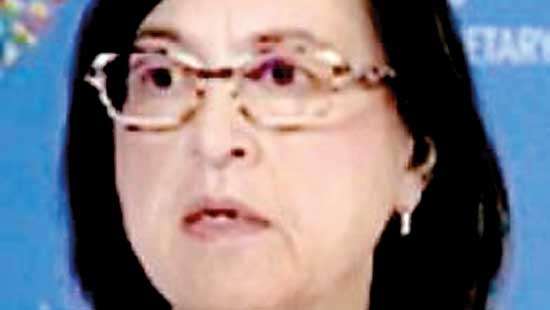Reply To:
Name - Reply Comment

The International Monetary Fund (IMF) expressed “deep” concern about the current situation prevailing in Sri Lanka and said it hopes it will be able to work fast to end the suffering, specially of the country’s poor and vulnerable.
 Addressing queries put forward by the media, including that of Mirror Business at the press briefing held last week, the IMF reiterated that although the staff-level agreement on a four-year EFF programme was reached, the initial disbursement of the programme will only come after the board meeting.
Addressing queries put forward by the media, including that of Mirror Business at the press briefing held last week, the IMF reiterated that although the staff-level agreement on a four-year EFF programme was reached, the initial disbursement of the programme will only come after the board meeting.
IMF Deputy Director of the Asia and the Pacific Department Anne-Marie Gulde-Wolf said the disbursement of IMF financing is “preconditioned on the authorities taking certain prior actions on which they are already working. And importantly, on reaching a solution on the debt situation so far.”
As the island nation’s debt is assessed as unsustainable at this stage, the IMF official shared that for the IMF executive board to approve it will need two specific financing assurances.
The first would be from official bilateral creditors, where the fund requires assurances that debt sustainability will be restored. The second assurance is to establish there are “good faith” efforts underway to deal with private sector debt.
Sri Lanka is currently working with its legal and financial advisors on this debt element.
With regard to the timeline, Gulde-Wolf said it is difficult to be specific in this regard since the process of debt negotiations usually takes time.
IMF’s experience from its member nations in this regard is that the timeline differs depending on who the creditors are and what is involved.
“We certainly are supporting the process as much as we can. And we hope that everybody can work expeditiously to get a process underway, and discussions have been starting, including with the support of all bilateral creditors that are involved,” she said.
Sri Lanka is and will remain a middle-income country
The International Monetary Fund (IMF) said that Sri Lanka is and will remain a middle-income country even after a decline in the Gross Domestic Product (GDP).
Mixed sentiments were expressed by the government last week when a proposal was approved in Cabinet to voluntarily downgrade Sri Lanka’s income status so that it can receive more concessions to help brave through the economic crisis that was brought about by severe mismanagement.
IMF Official Anne-Marie Gulde-Wolf stressed that “the EFF is not concessional. It’s a regular IMF facility.”
The Fund is currently working closely with the World Bank (WB) and the Asian Development Bank (ADB) on programmes for Sri Lanka.
While expressing confidence in the programmes helping to close the financing gap, Gulde-Wolf stressed the policies under the other multilateral lenders in their areas of expertise will be essential to resolve Sri Lanka’s longer-term growth problems.
Last week, the President’s Office shared Sri Lanka was pursuing a ‘reverse graduation policy,’ for a limited period of time.
President Ranil Wickremesinghe previously made references to Sri Lanka being deprived of concessional funding since it moved to the middle-income country bracket.
Sri Lanka was upgraded to an upper middle-income country in July 2019 by the World Bank after the country’s Gross National Income (GNI) increased from US$ 3,840 in 2018 to US$ 3,996. It slipped to the lower middle-income status a year after when the per-capita income reversed gains as Sri Lanka entered into a recession.
SL expects up to US$ 2bn worth multilateral funds from ADB and WB
Sri Lankan team in Washington, D.C. to continue debt restructuring talks alongside IMF, WB annual meetings
Sri Lanka is expecting to raise up to US$ 2.0 billion worth of bilateral loans collectively from the Asian Development Bank (ADB), the World Bank and other multilateral lenders as bridge financing after country secured programme support from the Fund, according to President and the Finance Minister Ranil Wickremesinghe.
According to him, ADB had already expressed its interest to provide Sri Lanka with a fresh US$ 500 million loan and such funds could be used to strengthen the external reserves which had fallen to levels which aren’t enough even to make the country’s essential imports.
In a further bid to improve foreign currency liquidity which has run dry in the domestic market, officials are also expecting to engage with other countries which are willing to provide Sri Lanka with bilateral financing.
Wickremesinghe however said accessing bilateral funding could take a relatively longer period than when obtaining multilateral financing but they could embark on the negotiations once the IMF deal becomes activated.
Sri Lanka officially launched debt restructuring talks on September 23 inviting all bilateral and private creditors to engage with the officials to expedite the debt restructuring talks to obtain financing assurances, a key sticking point to activate the IMF programme, which still remains at the staff-level.
However, the Central Bank remains hopeful that bilateral financing assurances could be obtained by mid-November and unlock the financing by December or early January next year.